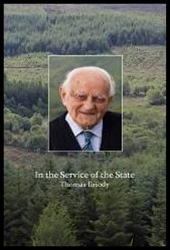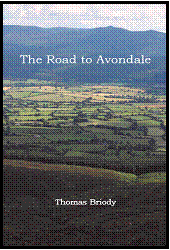|
Choice Publishing Book Store |



|
Funeral oration for Thomas (Tosty) Briody, given by his son Mícheál at the Requiem Mass, St Molleran’s parish church, Carrickbeg, Carrick-on-Suir, Tuesday 27th November, 2012
A Athair Oirmhinnigh, a dhaoine gaoil, a chomharsana agus a chairde. Is mian liom beagán a rá i dtaobh m'athar, go háirithe i dtaobh na bliana seo a ghaibh tharainn, an bhliain dheireanach dá shaol. I dtús báire ba mhaith liom buíochas a gabháil le gach éinne atá i láthair anseo inniu, bídís tar éis teacht ó chéin nó ó chóngar. Dear Relatives, neighbours, friends and Rev. Father Flynn. I would like to say a few words about my father, especially about the past year, the last year of his life. Firstly, however, I would like to thank everybody for coming here today, from both far and near. Some could not make it, however, but are here in spirit. In this connection I would like to mention his sister Anna Cecelia, his brother Gerald, his eldest son Tomás, who is still recouperating from a long illness, his grandchildren Katarina and Tuomas and his great-grand-daughter, Isabella Elizabeth. Ba mhaith liom chomh maith buíochas a ghabháil le Celine Coakley agus Conradh na Gaeilge as na bláthanna a chur ar an altóir agus le Bláthnaid, Pádhraic agus Paul de Róiste agus le Ruairí Mac Con Iomaire as an gceol. I would like to thank Celine Coakley, and the Gaelic League for the flowers on the altar and Bláthnaid, Pádhraic and Paul Roach and Ruairí Mac Con Iomaire for the music. Oscar wilde said: 'To lose one parent may be regarded as a misfortune, to lose both looks like carelessness.' A typically flippant Wildian statement one might say, but there may be some truth in it. There was no such carelessness, however, where my father was concerned. After my mother's death in November 2000 he became the centre of attention for his children and grandchildren, and indeed for many of his nephews and nieces. Some of us wondered how long he would survive our mother. Back in those gloomy months of late 2000 and early 2001 none of us would have thought that he would live to witness the twelfth anniversary of her death. He himself did not always feel he had a chance of approaching the hundred. Around the time he was ninety he said to me one day: 'At most there are five years in me.' When he reached ninety five he became more confident. But still he wondered, how close would he get to that magic number. One day in spring 2009 when we were chatting together he said out of the blue: 'Who fears to speak of ninety eight?' I knew immediately this was not a reference to the rebellion of 1798. I knew what he meant and he knew I knew. We both said nothing. Late last October, some weeks after Geraldine’s death, my father reached the age of 98. He no longer needed to fear speaking of ninety eight, but what of ninety nine? Around this time last year my father first became ill. Then on New Year's Eve he was admitted to hospital in Drogheda with pneumonia. When I saw him six days later he looked flattened, but he came back from that low ebb and was much improved when I again saw him in early March. Being ill was difficult for him to accept. He would often speak of when he would be better, or good enough to return to live in Crehanagh: to return to his garden and the view of of Slievenmon. Slievenamon for much of his life held a special importance for him. He had been forester there as a young man and knew the mountain and its people intimately. At some stage during the spring of this year my father no longer spoke of getting better and returning to Crehanagh. He would have wished to end his days in Crehanagh within sight of Slievenamon, but accepted it was not possible. Still he liked Drogheda, where he was being cared for by my sister Joan, as well as by my sisters Anne and Máire, who would come up to give her a hand. When I came last January to see him in hospital in Drogheda the first thing he said was: ' Mícheál I thought you'd never come!’ He was afraid he would not see his second book. I was also worried that I would not be able to finish editing it in time. I spoke to Joan of my worry. She believed he would live to see it. She may only have been trying to put me at my ease, but I know now she was determined to do her utmost that he would see the second volume of his memoirs. And she stuck to that resolve. Without Joan’s Trojan work this Mass would have been held many, many months ago. As you all know he lived to see his book and to see it launched in, and he spoke a few words that day but was overcome with emotion. However, two weeks later at his 99th birthday party he spoke at some length without notes. It was one of the best speeches I have heard him give. He did not think he would reach the hundred and said that this was most likely his ‘last hurrah’. Nevertheless he did not entirely rule out reaching the hundred, or at least making an effort. In the event that effort proved too much for him. I have spoken of the help my father received over the past year from my sisters. His daughters-in-law Sheelagh and Tuula, sons-in-law, Tom, Oliver and Paul, sons Tomás, Mattie and myself also played their part. His nephews, nieces, grand-children and great-grand-children should also be mentioned in this connection, as well as the many other visitors my father had in Drogheda, and in Carrick where he still came occasionally on holiday. Many people contributed to keeping my father’s spirits up and making his final year in this world as pleasant and as comfortable as it could be in the circumstances. But that is not the full story. There is someone left out. An old friend, whose acquaintance he remade last June at a wedding in Conamara: Arthur Guinness, now more than two hundred years old. My father would often say the Irish phrase: ‘Dá fhad é an lá, tagann an oíche.’ (‘However long the day, night comes.’) In editing his second book I was ever conscious night was approaching. He didn’t always feel that way, or at least he did not always express his thoughts on the matter. It is only a few years since he said to me one day: 'There's ten years in me yet.' His second cousin Annie Fitzsimons (née Briody), who died a few years ago, almost reached the age of a hundred and five. It was an age to emulate. It was possible, but was it achievable for him? Sometimes I thought that with a bit of luck he would reach the hundred and beyond, perhaps well beyond, like his cousin. But to do so he would have needed more than the right genes and the love and care of his family: he would also have needed a lot of luck. Last November my father’s luck ran out. But by any estimation he had a long life, and although much of it was a hard life, it was a good life, and a life well lived. By father forgave those who hurt him and did not hold grudges for very long. He would say: ‘I have to meet my maker!’ He had a deep and simple faith. Some of the young children here present, and some not so young, may reach the age of his cousin Annie Fitzsimons, 105 or thereabout. Yet all of us whatever age we reach or aim for, could do well to emulate this good and kind man. In the Gaeltacht in the old days when an old person, especially a very old person, died it used be said: ‘Nach breá an lá dhó é/í?’ (‘Isn’t it a great day for him/her?’) Is breá an lá dhó é! (‘It is a great day for him’); for Thomas (Tosty) Briody. Beannacht Dé air agus ar anmain na marbh! (God bless him and the souls of the dead!).
|
|
'Funeral Oration' |